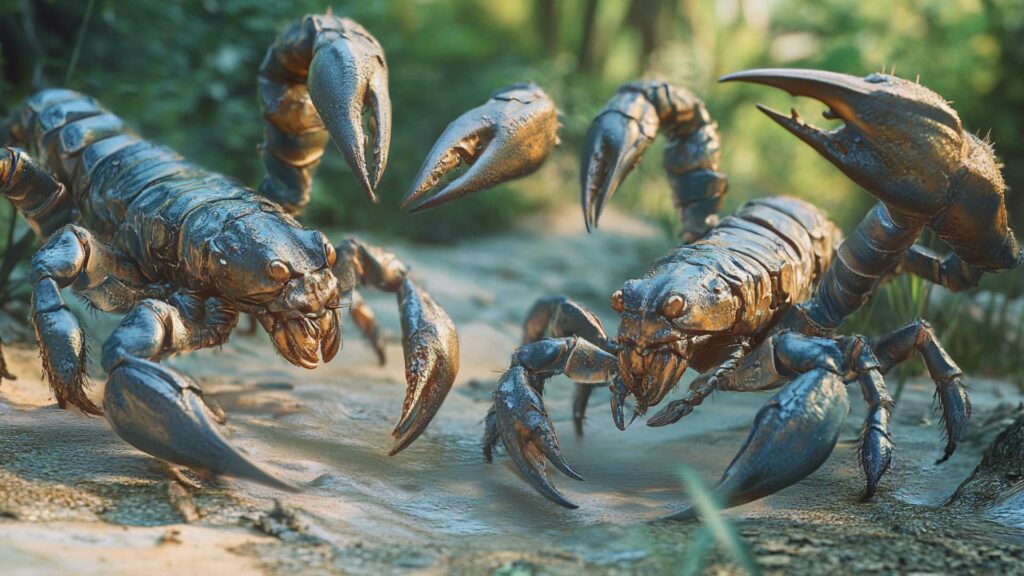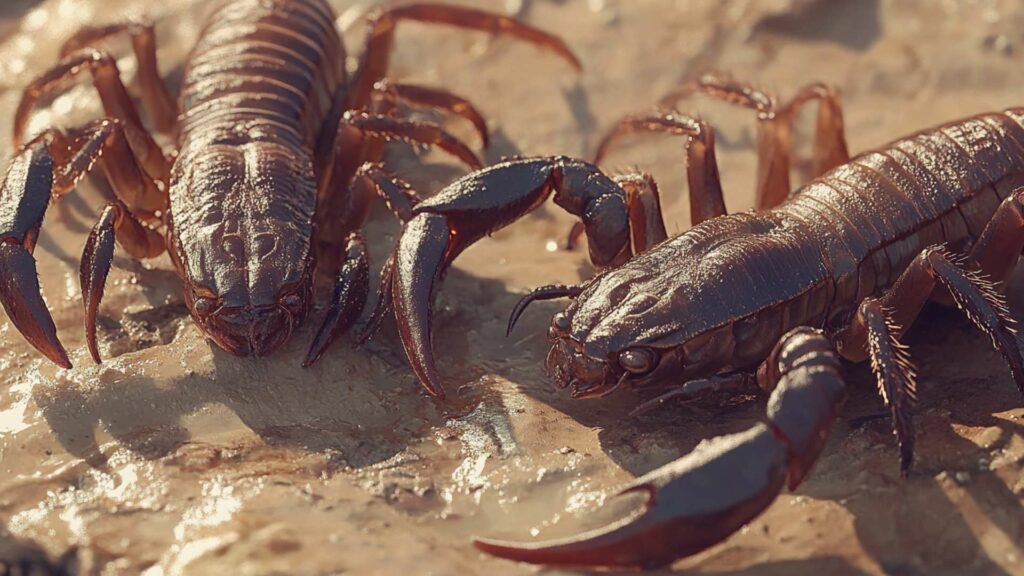The Diet of Scorpions
Scorpions are fascinating creatures that belong to the arachnid family. They are known for their venomous stingers and their love for darkness. But have you ever wondered what scorpions eat?
As you might have guessed, scorpions are not vegans – they are carnivorous and feed on other animals. Their diet varies depending on the species, but generally, they prefer insects, spiders, and other arthropods as their primary food sources.
Some larger species of scorpions also enjoy small mammals like lizards, snakes or mice. In some cases, scorpions even cannibalize other scorpions.
Scorpions use their large claws to grab onto prey and inject venom with their curved stingers. Their hunting techniques vary depending on the species.
Some ambush prey while others hunt during the night when it’s cooler. Interestingly enough, scorpions can go months without feeding if necessary because of a simple digestive system that can extract nutrients from solid matter efficiently.
Uncover the Secrets of Scorpions: Explore Their Fascinating Behavior and Characteristics! Dive into the intriguing world of scorpions and learn about their behavior, anatomy, and classification. Discover more in our article on scorpion behavior and characteristics!
General Diet
Scorpions are Carnivorous
Scorpions are fascinating creatures that belong to the arachnid family. They have four pairs of legs, two pincers, and a venomous stinger at the end of their tails.
Most scorpions are carnivorous and feed on a variety of food sources such as insects, spiders, and other arthropods. They are skilled predators that use their powerful pincers to grab their prey while simultaneously using their venomous stingers to subdue them.
They Primarily eat Insects, Spiders, and Other Arthropods

Scorpions live in various habitats all around the world. They can be found in deserts, forests, grasslands, and even tropical rainforests. Their primary food source is insects like crickets, beetles, and other bugs that they hunt down using their keen sense of smell.
Scorpions also prey on other insects like spiders and arachnids that share similar habitats with them. It’s interesting to note that some species of scorpions eat their own species!
When there’s scarcity or competition for food sources in an area or habitat where scorpions live together in large numbers (like some burrows), cannibalism is not an uncommon occurrence amongst these predators. Despite being formidable predators themselves, scorpions also have natural enemies such as larger animals like birds and reptiles who prey on them as victims.
Overall though, most scorpion species have very few natural predators thanks to their tough exoskeletons which allows them to withstand attacks from many other animals. There are also scorpion pets kept by some enthusiasts who feed them on a regular basis with live bugs or pre-killed mice – a practice popularly known as “gut loading”.
It’s crucial for pet owners to understand the feeding habits of their scorpions so that they can provide proper nutrition and care for them. In the next section, we’ll dive deeper into the specific prey that some scorpion species eat.
Specific Prey:
Small Vertebrates: Lizards and Mice
While most scorpions stick to a diet of insects and arthropods, some species bark scorpions are known to eat small vertebrates such as lizards and mice. The larger scorpion species like the Emperor Scorpion have powerful pincers that can easily grasp onto prey much larger than themselves.
When hunting these larger prey, the scorpions will use their stinger to inject venom, which immobilizes the victim. These larger meals provide a significant source of nutrition for the scorpion and can keep them satisfied for days.
Some pet owners might be surprised to find out that their pet scorpions require more than just a few bugs here and there. In fact, captive scorpions have been known to thrive on diets consisting primarily of vertebrates such as crickets or mealworms.
Cannibalism Among Scorpions
It might seem strange that a predator as fearsome as a scorpion would resort to cannibalism, but it is actually quite common among some species. Indeed, many wild-caught specimens are missing legs or claws having been attacked and eaten by other members of their own kind.
Captive individuals have also been recorded eating each other in cramped conditions where food sources were scarce. Interestingly enough, even though they may consume other members of their own species in desperation, cannibalism does not seem to be part of the typical diet.
In addition to consuming other scorpions for sustenance, certain species have also been known to utilize this tactic when competing for territory or mates. This behavior is most commonly observed in the bark scorpion (Centruroides exilicauda), especially during mating season when males will fight over females with ferocity seldom seen outside nature documentaries about snakes or lions!
Hunting Techniques
Pincers and Stingers

Scorpions are carnivorous creatures, and they use their unique anatomy to hunt for food. Their large claws, called pincers, are used to grab onto prey and hold them in place while the scorpion injects their venomous stinger.
The stinger is located at the end of the tail and is used to subdue or kill their prey. This is a highly effective method of hunting, as scorpions can quickly immobilize insects much larger than themselves.
Ambush Predators
Scorpions are known for being ambush predators, waiting patiently for unsuspecting prey to pass by before striking with lightning-fast reflexes. They are able to lie in wait for extended periods without moving, sometimes even days on end. Once they sense movement from potential prey, scorpions will swiftly move forward using their powerful legs to close the distance and attack with their pincers and stingers.
Nocturnal Feeders
Most species of scorpions prefer to hunt at night when temperatures are cooler. This enables them to remain hidden during the day when predators may be out looking for victims while also making it easier for them to locate prey under cover of darkness. As nocturnal feeders, many species of scorpions rely heavily on their keen senses of touch and smell rather than sight since they have poor eyesight.
Scorpion feeding habits can be fascinating as well as terrifying since these creatures have evolved into proficient hunters over thousands of years of evolution. It’s amazing how such small creatures with eight legs can take down much larger species like lizards or even other scorpions!
Digestion: A Simple but Effective System
Scorpions have a simple digestive system that allows them to extract the most possible nutrients from their prey. Once caught, the meal is quickly dispatched with the scorpion’s claws and tail, which injects venom into the body of the victim. The venom not only kills the prey but also begins breaking down its internal organs for easier digestion.
After this point, enzymes in the scorpion’s gut complete the breakdown of food into usable nutrients. Interestingly, scorpions can survive for months without feeding due to their efficient digestive system.
This adaptation helps them deal with times when food is scarce, such as during periods of drought or seasonal changes. During these times of scarcity, scorpions become even more opportunistic feeders than usual and will feed on any insect or small mammal they can catch.
Eating Habits: No Manners Required
When it comes to feeding time, scorpions have no manners – they will consume their prey whole if possible! Small invertebrates like bugs and grasshoppers are easily swallowed whole by larger species like Emperor Scorpions. Larger prey like lizards or mice are slashed apart by their sharp claws before being devoured piece-by-piece.
Unlike many predators that prefer live prey, some species of scorpion are opportunistic feeders who have been known to eat carrion found on the ground. It may not be pretty but there’s no question about it – when a hungry animal needs to feed, it will take what it can get!
A Remarkable Ability
The simple digestive system of scorpions provides these creatures with an advantage over other animals in times of scarcity while also maximizing nutrient uptake from their victims. While it may seem odd that an animal can survive months without feeding in a world where finding food is a daily struggle for many creatures, the scorpion’s ability to make the most of what it eats is nothing short of remarkable. Whether a pet scorpion or one in the wild, these creatures always find a way to feed and thrive.
Scorpions: The Ultimate Survivors
Scorpions are known for their resilience and ability to survive in harsh conditions with limited food sources. During times of scarcity, some scorpion species have been observed consuming unusual foods such as plants or carrion. While this behavior is not common among most species, it is a testament to the incredible adaptability of these predators.
When There’s Nothing Else Around: Plants and Carrion
During periods of drought or other environmental stressors that limit the availability of traditional prey, scorpions have been documented feeding on a variety of alternative food sources. Some species have been observed eating vegetation, including grasses and cacti. Others have been known to scavenge carrion, including small mammals or reptiles that have died in their vicinity.
The Pet Scorpion’s Unconventional Diet
For pet owners who keep scorpions in captivity, it’s important to provide them with a balanced diet that meets their nutritional needs. While most pet scorpions will thrive on a diet consisting primarily of insects such as crickets or mealworms, there may be times when unconventional food sources are necessary. In these instances, providing your pet scorpion with small amounts of plant material or carrion could help supplement their diet and ensure they continue to thrive.
Whether scavenging for carrion or nibbling on vegetation during times of scarcity, the ability of some scorpion species to adapt their diets speaks volumes about their resilience and survival instincts. While it may seem strange for a hunter like the scorpion to consume unconventional foods like plants or carrion, this behavior underscores just how resourceful these creatures can be when faced with challenging circumstances.
A Recap of Scorpion’s Diet
Scorpions are fascinating creatures with a unique diet. As we have seen, most species of scorpions are carnivorous and prefer to eat invertebrates like insects, spiders, and other arthropods.
Some scorpion species also prey on small vertebrates like lizards and small rodents and mice. One thing is clear; they have an appetite for meat.
While hunting, scorpions use their pincers to grab prey and their stingers to inject venom that paralyzes the victim. They often ambush prey by lurking silently for the perfect opportunity or hunt at night when it’s cooler.
Interestingly, some species of scorpions are cannibalistic, and they feed on their own kind if they’re running low on other food sources. Scorpions can survive without food for a long time due to their simple digestive system.
Their feeding habits vary depending on factors such as location and environment. For example,’ bark scorpion,’ found mainly in the southern regions of North America can eat plants or carrion during times of scarcity.
While most people don’t think about what do scorpions eat when they think about having them as pets or encounter them outside; it is essential knowledge if someone owns a pet scorpion or lives in a region where these creatures are common predators. We hope this article has shed some light on the fascinating world of these arachnids’ dietary habits’.
Looking to overcome Scorpion infestation in Las Vegas? Look no further than D-Termination: The leading pest control service in the city!

We understand your concerns about scorpions invading your property, and our skilled professionals are here to help. With our expertise in eradicating these dangerous creatures, we ensure the safety of your surroundings. Bid farewell to scorpion anxieties by opting for D-Termination’s efficient pest control solutions.
Get in touch with us at 702-919-6310 or visit dtermination.com to schedule your scorpion control service and regain control over your space, free from these unsettling pests.
Frequently Asked Questions:
Scorpions’ favorite food varies depending on the species, but they generally feed on insects, spiders, and small arthropods.
Scorpions in a house typically eat other household pests like cockroaches, crickets, and ants.
Scorpions dislike strong vibrations, bright lights, and certain strong smells like citrus or lavender.
Scorpions are most attracted to dark, sheltered areas where they can hide during the day, as well as areas with a good supply of their prey.








